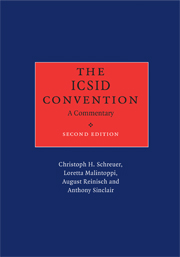Book contents
- Frontmatter
- Contents
- Foreword by Professor Sir Elihu Lauterpacht, CBE, QC
- Authors' preface to the second edition
- Table of cases
- List of abbreviations
- Text of the ICSID Convention
- Procedural calendar
- PREAMBLE
- CHAPTER I International Centre for Settlement of Investment Disputes
- CHAPTER II Jurisdiction of the Centre
- CHAPTER III Conciliation
- CHAPTER IV Arbitration
- CHAPTER V Replacement and Disqualification of Conciliators and Arbitrators
- Article 56 Replacement
- Article 57 Proposal to Disqualify
- Article 58 Decision to Disqualify
- CHAPTER VI Cost of Proceedings
- CHAPTER VII Place of Proceedings
- CHAPTER VIII Disputes between Contracting States
- CHAPTER IX Amendment
- CHAPTER X Final Provisions
- Final Clause
- Consolidated bibliography
- Index by article
- Index by subject
Article 56 - Replacement
from CHAPTER V - Replacement and Disqualification of Conciliators and Arbitrators
Published online by Cambridge University Press: 07 September 2010
- Frontmatter
- Contents
- Foreword by Professor Sir Elihu Lauterpacht, CBE, QC
- Authors' preface to the second edition
- Table of cases
- List of abbreviations
- Text of the ICSID Convention
- Procedural calendar
- PREAMBLE
- CHAPTER I International Centre for Settlement of Investment Disputes
- CHAPTER II Jurisdiction of the Centre
- CHAPTER III Conciliation
- CHAPTER IV Arbitration
- CHAPTER V Replacement and Disqualification of Conciliators and Arbitrators
- Article 56 Replacement
- Article 57 Proposal to Disqualify
- Article 58 Decision to Disqualify
- CHAPTER VI Cost of Proceedings
- CHAPTER VII Place of Proceedings
- CHAPTER VIII Disputes between Contracting States
- CHAPTER IX Amendment
- CHAPTER X Final Provisions
- Final Clause
- Consolidated bibliography
- Index by article
- Index by subject
Summary
INTRODUCTION
Art. 56 is the first of three Articles in the Convention's Chapter V headed “Replacement and Disqualification of Conciliators and Arbitrators”. Art. 56(1) deals with the principle of the unchanged composition or immutability of a commission or tribunal and with the replacement of conciliators or arbitrators should the need arise. Art. 56(2) states that the expiry of membership on the Panel of Conciliators or Arbitrators does not affect membership in a commission or tribunal. Art. 56(3) provides a special procedure for the replacement of conciliators or arbitrators in case of their resignation without the consent of the commission or tribunal. Art. 57 deals with proposals for the disqualification of conciliators or arbitrators. Art. 58 deals with the procedure for decision on such proposals and the consequent replacements.
Art. 56 serves the principle of non-frustration of proceedings by avoiding truncated commissions or tribunals. It seeks to avoid vacancies primarily through a speedy replacement of conciliators or arbitrators who have become unavailable.
The drafts to what eventually became Art. 56 show little change during the work on the Convention (History, Vol. I, pp. 256, 258, 260). There was relatively little discussion and no controversy concerning these provisions (see paras. 6, 11, 16, 31, 36 infra).
- Type
- Chapter
- Information
- The ICSID ConventionA Commentary, pp. 1186 - 1196Publisher: Cambridge University PressPrint publication year: 2009



